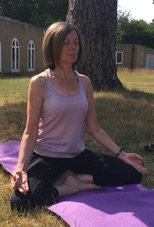2008
Here are some tips, links, etc to support your meditation practice
Meditation & breathing practices
There are many definitions of meditation and infinite methods, from straightforward to complex. Some come with warnings, others with grand claims. Meditation is the action or process of calming or stilling the mind.
We are mostly drawn to the practice for peace of mind and relaxation of body. Other benefits include: a more positive outlook, improved health, improved sleep, increased energy and better concentration. We find a method or style that suits us and once we have something that feels right we stay with it for a while and enjoy the effects.
Posture for meditation and breathing practices
You can sit on a chair or sit or kneel on the floor using blankets, cushions or blocks for support. It is also ok, if necessary, to lie down. To be comfortable you need to come into a position that allows you to relax and keeps your spine long; your mind alert. You should be warm.
Your lower body releases into the support of the chair or floor and you consciously let go of any holding on. If you are on a chair you can place some support under your feet. From the stability of your base you gently extend your spine and softly lengthen the back of your neck. Release and relax your shoulders. Soften your jaw and the muscles of your face.
Your personal practice
Some people have a regular meditation time, sometimes daily, sometimes a few times a week. You find moments where you can be still and bring your awareness into the present.
Some have developed their practice and benefit from between 10 or 20 minute daily or every other day. You can choose different techniques or attend a class or group meditation, live or online.
There are many apps around and people find them helpful
Resting the mind on the breath
Following the flow of the breath is not only very relaxing it is an effective way of focussing the mind. It is not a pranayama (breathing) practice but used as a meditation tool. You can just watch the breath; observing it, not controlling it.
You can also develop The Grand Yoga Breath which is an excellent method for everyone to learn as it improves breathing habits and it has a positive effect on every system of our body.

Candle gazing is a popular method for focussing the mind. Here’s what you do...
Deep relaxation
-
‣ Click here for sound recording of Yoga Nidra
-
‣ Click here for 6 minute sound recording to relax and focus
Yoga and well-being with Lesley Doveton




